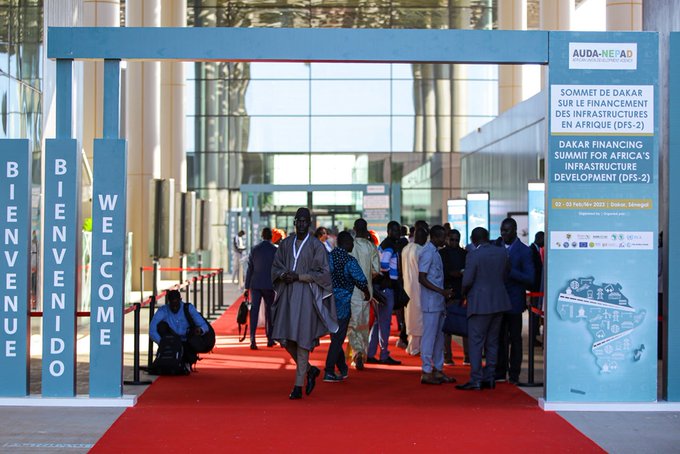By Baboloki Semele
An important landmark in the financing of infrastructure development in Africa was reached at the second Dakar Financing Summit, held in Dakar, Senegal from 1-3 February.
Participants from African Union Member States, the private sector, development finance institutions (DFIs), institutional investors, development partners, and the media met and discussed at great length the type and model of infrastructure financing that is viable for the Programme for Infrastructure Development in Africa (PIDA) priority action plan 2 (PIDA PAP 2).
The second Dakar Financing summit borrows from the first Dakar Financing summit held on 15 June 2014, which produced “The Dakar Agenda for Action (DAA)”, which guided financing for projects under PIDA PAP 1. The purpose of the second Dakar financing Summit was to mobilize key stakeholders around the efforts of the African Union and AUDA-NEPAD to accelerate the implementation of priority regional infrastructure projects.
The three-day summit concluded with a call to Member States and Regional Economic Communities to include PIDA projects in their national development plans and budgets and to link national infrastructure development to regional and continental infrastructure networks.
The summit further called on Member States, in coordination with AUDA-NEPAD and Regional Economic Communities, to strengthen risk mitigation systems in order to accelerate private investment and improve the business climate. The investors and technical and financial partners were urged during the summit deliberations to support AU Member States in raising the resources needed to make PIDA projects bankable whilst AUDA-NEPAD was requested to report on progress through the AU governance mechanisms at the next Summit.
Participants agreed in unison for increased funding and consolidation of services for the preparation of infrastructure projects, and in this regard, urged African governments, development finance institutions, and international partners to increase their support and funding for infrastructure project preparation, especially the NEPAD Infrastructure Project Preparation Facility (IPPF) under the African Development Bank and the PIDA Service Delivery Mechanism (SDM) under AUDA-NEPAD.
As the globe is grappling with the fight against climate change, the summit seized the opportunity to welcome the updating of the PIDA Quality Label (PQL) for project preparation under the Service Delivery Mechanism (SDM) in order to take into account climate resilience and green infrastructure when implementing Economic Corridor Projects in Africa. Consequently, the summit welcomed Alliance for Green Infrastructure in Africa (AGIA) initiative launched by the African Union, the African Development Bank and Africa50, along with other partners, which aims to accelerate Africa’s transition to Net Zero.
Held under the theme “Maintaining the momentum towards world-class infrastructure in Africa”, the second Dakar Financing Summit was organized by AUDA NEPAD under the distinguished patronage of His Excellency President Macky Sall of Senegal, Chairperson of the African Union.
The Dakar Summit mobilized key stakeholders around the efforts of the African Union and AUDA-NEPAD to accelerate the implementation of priority regional infrastructure projects. By bringing together the highest decision-makers from the public and private sectors, the Summit provided a platform to find practical ways to improve project preparation and identify innovative financing structures involving public and private financing.
At the end of the Summit, project owners and developers came with a better understanding of how to effectively design project preparation, and at the same time, potential financiers addressed the issue of obstacles to the financial viability of projects, and as such technical and financial partners, MDBs, DFIs, Guarantee Funds, and the banking sector were urged to ease financing conditions, including reducing interest rates, raising the debt ceiling and budget deficit limits.
The Programme for Infrastructure Development in Africa (PIDA) is the basis for the implementation of priority projects to transform Africa and the inspiration for the financing of the construction of modern infrastructure based on the PIDA Priority Action Plan (PAP) projects, or better still, PIDA is the African Union’s (AU) continental infrastructure framework to address infrastructure bottlenecks through cross-border infrastructure development in the areas of Transport, Energy, Information and Communication Technology (ICT) and Water.
In February 2021 the AU Heads of State and Government adopted the Second Priority Action Plan (PIDA PAP 2), comprising of 69 priority infrastructure projects to be implemented by 2030 complemented by an
implementation plan and financing strategy.
According to the PIDA Financing Strategy, the 69 PIDA PAP 2 projects represent an aggregate CAPEX of USD$ 160.8bn. The average annual infrastructure commitments required for the PIDA-PAP 2 during its implementation period 2021-2030 result in USD$ 16 bn, 60% higher than the yearly average of financing commitments secured during PIDA-PAP 1 (USD$ 10 billion over 8 years). PIDA-PAP 2 projects have been selected ensuring an equal regional distribution in the number of projects across African regions. Nevertheless, the distribution of CAPEX costs differs significantly among regions.
Whereas projects’ CAPEX costs in Western and Eastern Africa account for US$ 40.5 billion and USD$ 37.9 billion respectively, other regions such as southern and central Africa account for US$ 13.8 billion and USD$ 8.6 billion, respectively. Additionally, there are 17 multi-regional projects with an estimated cost of USD$ 43.6 billion.
Through the Dakar Financing summit, it is anticipated for PIDA stakeholders such as AUDA-NEPAD, AfDB, regional development banks, AFREXIMBANK, UNECA, RECs, and the African Continental Free Trade Area Secretariat to strengthen mutual cooperation in order to promote support infrastructures for intra-African trade






